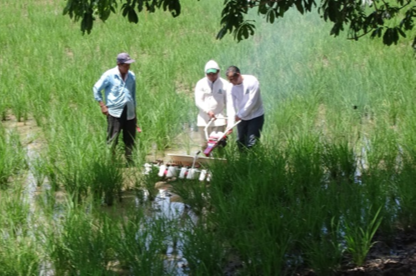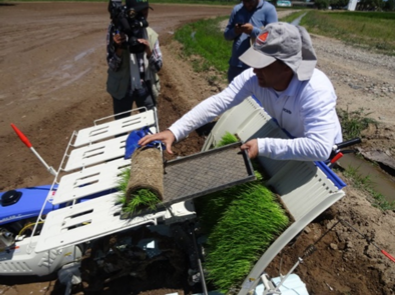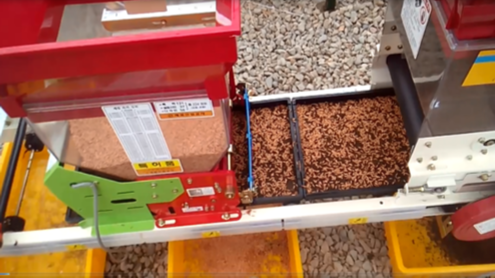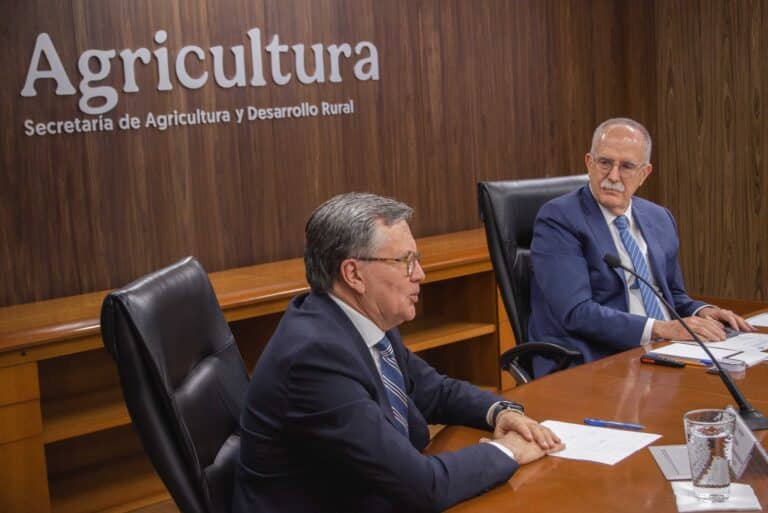With the support of the private sector, farmers in the Dominican Republic have been working to mechanize the transplanting process and the weeding to overcome this obstacle

One of the major challenges associated with implementation of the System of Rice Intensification (SRI) in the Americas is the scarcity and high cost of labor needed to transplant young, healthy rice plants and to weed the fields, since flooding is discouraged. With the support of the private sector, farmers in the Dominican Republic have been working to mechanize the transplanting process and the weeding to overcome this obstacle.
In Colombia, the first trial of SRI in the field of smallholders produced excellent results. The major challenge, as expected, was the need for a lot of manual labor, principally for weed removal. Machinery was recently imported from South Korea, arriving at La Tolima, Saldana in early June to where the validation parcels are located. An expert from IICA, Diddier Moreira, traveled to Tolima to help the team there set up, calibrate, and test the equipment. Two different types of motorized weeders, an automatic seeder to fill trays, and a transplanter were adjusted to meet the specifications of SRI. The results are very promising and both the farmers and technicians are excited to employ the machinery in the next cycle.

- The advances being made with SRI in Colombia and the Dominican Republic were shared during a webinar hosted by the EUROCLIMA Project. SRI Expert, Diddier Moreira, explained the principles of the system, as well as the results being obtained in the region and the principal challenges that still need to be overcome. The presentation and a recording of the webinar can be found here.
- IICA recently presented some of the results of its project on the System of Rice Intensification (SRI) at the 53rd Annual Conference of the Association for International Agriculture & Rural Development (AIARD) held in Washington, DC in early June. IICA presented during the round of Lightning Talks, and then hosted a round table discussion regarding the actions being undertaken in Colombia and the Dominican Republic. Presentations from the session can be found here.
- The results of the second cycle of rice production in the Dominican Republic and the first cycle in La Tolima, Saldana, Colombia were presented to 60 researchers and the heads of 15 of the national agricultural research centers of Latin America during the XII Technical Monitoring Workshop of FONTAGRO held in La Ceiba, Honduras from June 20 to 23rd. Participation provided an opportunity to raise awareness of SRI, receive feedback from other researchers and discuss advances with the coordinator of another project working with SRI in Nicaragua, Costa Rica, and Panama.

The project Cultivate More with Less: Adaptation, validation and promotion of the System of Rice Intensification (SRI) in the Americas as a response to climate change is being implemented by a consortium of IDIAF, CONIAF, FEDEARROZ and IICA. The project is supported by FONTAGRO and the GEF.
More information: kelly.witkoski@iica.int
*The opinions expressed in this newsletter are those of the authors and they do not reflect the position of the Institute on the topics presented.
*This post appears in the IICA Delegation in the USA Newsletter – May – June 2017











